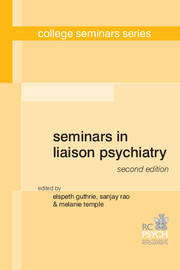Book contents
- Frontmatter
- Contents
- Abbreviations
- List of boxes, tables and figures
- List of contributors
- 1 Basic skills and competencies in liaison psychiatry
- 2 The liaison psychiatry curriculum
- 3 Classification and diagnosis
- 4 Capacity and consent
- 5 Psychological reaction to physical illness
- 6 Medically unexplained symptoms
- 7 Alcohol and substance use in the general hospital
- 8 Accident and emergency psychiatry and self-harm
- 9 Perinatal psychiatry
- 10 General medicine and its specialties
- 11 Liaison psychiatry and surgery
- 12 Neuropsychiatry for liaison psychiatrists
- 13 Psycho-oncology
- 14 Palliative care psychiatry
- 15 Sleep disorders
- 16 Weight- and eating-related issues in liaison psychiatry
- 17 Disaster management
- 18 Liaison psychiatry and older people
- 19 Paediatric liaison psychiatry
- 20 Primary care and management of long-term conditions
- 21 Occupational medicine
- 22 HIV and liaison psychiatry
- 23 Sexual dysfunction
- 24 Psychopharmacology in the medically ill
- 25 Psychological treatments in liaison psychiatry
- 26 Research, audit and rating scales
- 27 Service models
- 28 Developing liaison psychiatry services
- 29 Multiple choice questions and extended matching items
- Appendix 1 Specific competencies
- Appendix 2 Learning objectives with assessment guidance
- Index
6 - Medically unexplained symptoms
Published online by Cambridge University Press: 02 January 2018
- Frontmatter
- Contents
- Abbreviations
- List of boxes, tables and figures
- List of contributors
- 1 Basic skills and competencies in liaison psychiatry
- 2 The liaison psychiatry curriculum
- 3 Classification and diagnosis
- 4 Capacity and consent
- 5 Psychological reaction to physical illness
- 6 Medically unexplained symptoms
- 7 Alcohol and substance use in the general hospital
- 8 Accident and emergency psychiatry and self-harm
- 9 Perinatal psychiatry
- 10 General medicine and its specialties
- 11 Liaison psychiatry and surgery
- 12 Neuropsychiatry for liaison psychiatrists
- 13 Psycho-oncology
- 14 Palliative care psychiatry
- 15 Sleep disorders
- 16 Weight- and eating-related issues in liaison psychiatry
- 17 Disaster management
- 18 Liaison psychiatry and older people
- 19 Paediatric liaison psychiatry
- 20 Primary care and management of long-term conditions
- 21 Occupational medicine
- 22 HIV and liaison psychiatry
- 23 Sexual dysfunction
- 24 Psychopharmacology in the medically ill
- 25 Psychological treatments in liaison psychiatry
- 26 Research, audit and rating scales
- 27 Service models
- 28 Developing liaison psychiatry services
- 29 Multiple choice questions and extended matching items
- Appendix 1 Specific competencies
- Appendix 2 Learning objectives with assessment guidance
- Index
Summary
The term medically unexplained symptoms refers to physical symptoms for which there is either no or insufficient evidence of any underlying conventional disease/disorder process. There is a wide spectrum of severity ranging from essentially normal experience (e.g. an occasional headache) to symptoms which result in severe and long-standing disability. Where symptoms group together in clusters suggestive of a link to a particular bodily system, they have been termed functional somatic syndromes. The term somatoform disorders refers to a specific set of formal psychiatric diagnoses involving conditions which predominantly present with physical symptoms or a worry about physical disease. Only people at the more severe end of the medically unexplained symptoms spectrum meet criteria for one of the somatoform disorders and there is considerable dissatisfaction with the current psychiatric classification system for these conditions, which is discussed later in this chapter.
Functional somatic syndromes
By the time most people with medically unexplained symptoms are referred to a liaison psychiatrist, they are likely to have picked up a label of one or more of the functional somatic syndromes (e.g. irritable bowel syndrome, functional dyspepsia, fibromyalgia). Many different functional syndromes have been described over the past 30 years according to different symptom clusters (Table 6.1). There is considerable overlap in symptoms between different functional conditions and somatoform disorders, yet most of these syndromes are studied as if they are discrete conditions within particular medical specialties, with a focus on the specific set of somatic symptoms, which are specialty specific.
There is still uncertainty as to the degree of overlap of these conditions and the relative common factors they may share. In one study, Fink et al (2007) studied 978 patients admitted to hospital from primary care and a medical and neurological department who scored highly on somatic screening measures. They found that patients complained of a median of five functional somatic symptoms (women six and men four). Principal component analysis identified three symptom groups explaining 37% of the variance: cardiopulmonary, musculoskeletal and gastrointestinal. Further analysis showed that the symptom groups were not discrete and patients were likely to report symptoms from different groups, suggesting that the groups were different manifestations of a common latent phenomenon: bodily distress.
- Type
- Chapter
- Information
- Seminars in Liaison Psychiatry , pp. 66 - 85Publisher: Royal College of PsychiatristsPrint publication year: 2012

